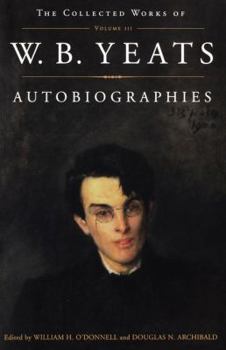The Collected Works of W.B. Yeats Vol. III: Autobiographies
(Book #3 in the The Collected Works of W.B. Yeats Series)
Select Format
Select Condition 
Book Overview
Autobiographies consists of six autobiographical works that William Butler Yeats published together in the mid-1930s to form a single, extraordinary memoir of the first fifty-eight years of his life, from his earliest memories of childhood to winning the Nobel Prize for Literature. This volume provides a vivid series of personal accounts of a wide range of figures, and it describes Yeats's work as poet and playwright, as a founder of Dublin's famed Abbey Theatre, his involvement with Irish nationalism, and his fascination with occultism and visions. This book is most compelling as Yeats's own account of the growth of his poetic imagination. Yeats thought that a poet leads a life of allegory, and that his works are comments upon it. Autobiographies enacts his ruling belief in the connections and coherence between the life that he led and the works that he wrote. It is a vision of personal history as art, and so it is the one truly essential companion to his poems and plays. Edited by William H. O'Donnell and Douglas N. Archibald, this volume is available for the first time with invaluable explanatory notes and includes previously unpublished passages from candidly explicit first drafts.
Format:Paperback
Language:English
ISBN:0684853388
ISBN13:9780684853383
Release Date:March 1999
Publisher:Touchstone Books
Length:560 Pages
Weight:1.36 lbs.
Dimensions:1.5" x 5.5" x 8.4"
Customer Reviews
3 ratings
The great poet as a disappointing person and thinker
Published by Thriftbooks.com User , 20 years ago
Yeats is without doubt one of the great English language poets of the twentieth century . His greatest poems and lines are in the hearts and minds of most lovers of poetry. How disappointing then to feel that the person is in many ways so mediocre in both his thought and his personal relationships. The whole business of automatic writing is one part of it. But also the whole search for some kind of mythic system smacks of superstition, and perhaps makes Yeats suitable for an age where the 'New Age' sections of bookstores are far larger than the Religion of Philosophy sections. As a person Yeats seems a somewhat remote husband and distant relative even to his closest family members. This autobiography has no great moving intellectual center, no ideas which truly make sense in understanding our world . " Things fall apart the center does not hold, " the great lines which describe our condition are unfortunately not complemented by a true and deep understanding of the human situation.
A joy to read and marvellous background
Published by Thriftbooks.com User , 24 years ago
The more I have learnt about Yeats and his life the more approachable and enjoyable I have found his poetry. I bought this book for a close friend and fellow lover of Yeats poetry and read it after she did. Yeats writes about his life and philosophy with the same skill and breadth he brings to his poetry. I found the notes added for this edition both useful and interesting. I would recommend this book to anyone with an interest in Yeats, his philosophy, life and poetry.
This new, standard edition is the first to provide notes.
Published by Thriftbooks.com User , 26 years ago
This new, standard edition is the first to provide explanatory notes. The text has been rigorously checked against earlier editions and manuscripts. The index usefully includes both the text and the notes. (I am editor of the book.)






